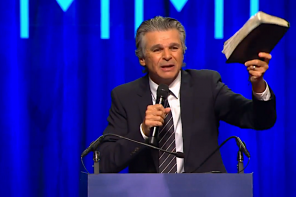A few days ago, Ben Carson sat down for an interview with Christianity Today. Speaking with the nation’s most influential evangelical magazine has become a regular rite of passage for presidential aspirants, particularly of the Republican variety, and a critical means for establishing one’s evangelical convictions. (Carly Fiorina and Jeb Bush both have already spoken with the publication.) Carson wasted no time appealing to his conservative Christian audience, drawing attention to the challenges he’s faced advocating his “strong Christian values in a secular progressive society.”
Carson has sounded the alarm of secular progressivism throughout his campaign, often more dramatically than he did with Christianity Today. Just last month, in an address at Liberty University, Carson inveighed against the secular progressives “who are trying to push God out of our lives.”
“Let me tell you,” Carson continued, “our nation’s survival as the pinnacle nation in the world…is rooted in our values system, the values and principles that made us into a great nation. And the real question is: Are we willing to stand up for those values and principles? Or will we allow ourselves to be intimidated by the secular progressives?”
While many struggled to understand his late summer spike in popularity, Carson’s standing with conservative Republicans, especially evangelicals, owes in large part to his frequent warnings about the threat of secular progressives to the American nation. In targeting secular progressives, Carson establishes his conservative Christian bona fides by speaking in the religio-political language that has helped mobilize evangelicals since the 1970s—a language grounded in a Biblical worldview and a logic that construes all policy debates in terms no less than good versus evil.
Carson’s language (and political vision) draws from the writings of Francis Schaeffer, the most influential intellectual figure in the history of the Religious Right. In developing his ideas on secular humanism, Schaeffer, a fundamentalist Presbyterian minister and author, gave Christian conservatives a theological framework for the political world and cast American evangelicals as the nation’s sole defenders in a cosmic struggle for righteousness. Carson now leads that fight.
Even before Schaeffer popularized the idea of “secular humanism,” various religious leaders argued that the Supreme Court’s decisions outlawing school prayer and Bible reading in the 1960s promoted secular humanism over the nation’s Judeo-Christian heritage. But Schaeffer took that inchoate and somewhat shapeless fear and gave it coherence and force in the 1970s.
In his sermons and writings, Schaeffer characterized the history of western civilization as a struggle between Christianity and secular humanism, a war that played out in the mystical realm between two competing ideas. But as he tried to mobilize evangelicals to become involved in politics after the events of the 1960s, Schaeffer realized the political advantage of targeting real people rather than a philosophical abstraction. His 1976 classic, How Should We Then Live?, spoke of secular humanists as real people: the judges who had outlawed school prayer, the politicians who had legalized abortion.
In shifting focus from secular humanism to secular humanists, Schaeffer brought the cosmological struggle out of the mystical realm and into the real world of politics where evangelicals could battle against humanists to win control of the nation and thereby preserve Christianity. Secular humanism would always be with us, Schaeffer explained, but it could be constrained by defeating secular humanists at the ballot box. If America’s Christians did not become involved in politics, they risked watching their nation turn into godless Europe, where secular progressives had replaced Christianity with socialism.
Schaeffer’s message electrified evangelicals just as the Religious Right was starting to take shape. How Should We Then Live? became an instantaneous hit, sitting atop the New York Times bestseller list for more than two years. Evangelical seminaries, colleges, churches, and Sunday schools all incorporated the book in their lessons, shaping evangelical ideas about politics and spurring greater public involvement. A film version of the book reached even larger evangelical audiences. Sold-out crowds across the nation watched the film and participated in all-day seminars to equip these Christians for political battle against secular humanists.
Since the 1970s, the Religious Right has led that fight. But the bogeyman of secular humanists has remained largely in evangelical subculture and in conservative media, mostly outside the realm of presidential politics.
Now Ben Carson has centralized that language in his campaign and foregrounded it in the Republican contest for president. Speaking of “secular progressives,” and the political advantage of targeting real people rather than a philosophical abstraction, Carson has referred to Hillary Clinton as “the epitome of the secular progressive movement.”
Clinton’s been called plenty of things through the years, of course. But for a certain slice of the American electorate, there’s no more damning condemnation.





